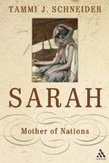SARAH: MOTHER OF NATIONS
Written by Tammi J. Schneider Reviewed By Robin Gallaher BranchTammi J. Schneider provides a text-centred examination of Sarai/Sarah, the wife of Abram/Abraham and mother of Isaac. Schneider’s valuable research concentrates on the Masoretic text’s markings and therefore presents the patriarch’s consort as a woman whom the Deity (to use Schneider’s phrase) protects, blesses, and calls equally with her husband in establishing a people later called Israel (1).
Schneider, associate professor of religion at Claremont Graduate University, is well qualified to write about Sarah and Hebrew Bible biblical narration because she wrote on Judges for the esteemed Berit Olam series.
Schneider’s work is unusual because it bypasses Aggadah, the extra-biblical Jewish literature that surrounds many biblical characters. Furthermore, it utilizes primarily three outstanding, though dated, commentaries on Genesis. Schneider values Walter Brueggemann for theology, Gerard von Rad for literary criticism, and E. A. Speiser for philological and ancient Near Eastern insights (4).
Schneider writes that Sarah has not always been treated well by the reading and believing public, largely because of the matriarch’s treatment of Hagar, her Egyptian slave. Some see Sarah as petty, indulgent, self-absorbed; others see her as passive and in cahoots with Abraham in his worst moments; still others call her a Mesopotamian princess (1). Schneider finds these views defective and seeks to discover Sarai/Sarah from the text itself. Her emphasis, she writes, is to understand the role of Sarai and her contemporaries in the Hebrew Bible (54).
Schneider finds that ‘Sarah is as much chosen by the Deity as is Abraham’ (5) and that her actions and Abram’s do not parallel each other (20).
Genesis 12 and 13 focus on the family relationships of Abram, Sarai, and Lot. Abram’s nephew. Here, Sarai emerges as the one whom Abram treats very badly. Abram’s ‘concern is not with her but for his own life and wealth’, Schneider writes (38). ‘Sarai is a liability, and Abram uses her best to support his goals and aspirations.’
Schneider notes Sarai’s attempts to get a son through Hagar backfire. ‘In Genesis 17 the Deity moves into the situation to clarify finally what Sarah’s status will be in the family’, Schneider writes (61). The Deity tells Abram that Sarai will be a mother, and her son will inherit the promise. The text does not record that Abram conveys the Deity’s message to Sarai; actually, Abram seems indifferent to another child and makes plain his preference for Ishmael.
To my thinking, Schneider’s work contains major insights. For instance, the Deity protects Sarah from her husband. The Deity provides for her. He changes her name and tells Abram to listen to his wife. He saves her in Egypt after Abram sells her into Pharaoh’s harem. Furthermore, Genesis 18 shows that Sarah does not fear the Deity but fears her husband. And wed she should—because he has had her in another man’s harem (Gen. 12) and soon she will find herself in a Abimelech’s harem (Gen. 20) When Sarai hears from the Deity that she will have a son, she laughs ‘to herself’ (Gen. 18:12). But her laughter, Schneider says, is more in line with her knowledge of Abraham’s virility. Her response contains no explicit questioning of the Deity’s plans. Instead her laugh expresses joy (72). She does not know that her husband earlier laughed about the prospect of a son; but she does know that he does not say a word when the Deity blames her for laughing (Gen. 17:17; 18:13) (73)
Actually, although Sarah has no conversations with the Deity, she seems to know him better than does her husband. Unlike her husband, Sarah does not need to be tested; her loyalty to the Deity is always clear, Schneider writes (107).
Schneider observes that Abraham honours Sarah in death in ways he never did during her life (121). Although he remarries, his new children receive no inheritance. Abraham is buried next to Sarah in the cave of Machpelah (121). But it takes the Deity textually again to stick up for Sarah and to accord her again an equal place with her husband Abraham. Isaiah 51:2 refers to her as the one ‘who brought you forth’ (122).
The book neglects Sarah in the New Testament. This, in my view, is its major weakness. Schneider handles Sarah in the New Testament unsatisfactorily in a short appendix (131–33) with no scholarly commentaries or journal articles. Schneider, however, makes a disclaimer because the New Testament is not part of her heritage. I hope Christian scholars and translators will use their Hebrew Bible work to take a fresh look at Sarah and New Testament passages
Robin Gallaher Branch
Sterling College, Sterling, Kansas







